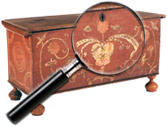Parian was first marketed in 1846 by the British pottery firm of Copeland as a white porcelain-like body, slightly translucent. Named “Parian” by the Minton pottery, this ware was introduced by Wedgwood in 1848 as “Carrara Ware”. This pottery type has come to be known as Parian generically, regardless of manufactory, and in its pure white form, was used mainly for figures, groups and busts. Wedgwood also made other shapes in Parian, particularly ornamental vases, which were glazed and gilded after application of enamel to the white Parian. These vases have the appearance of finely detailed majolica. Wedgwood also attempted the pate-sure-pate technique over Parian for vases, copied from Marc Louis Salon’s productions at Minton, but very few of these wares were ever produced. Parian is no longer in production at the Wedgwood factory.
|
|||||||
Parian pottery |
|||||||
|
Copyright p4A.com, ltd. & Internet Antique Gazette - 2025 - All Rights Reserved |
|||||||
